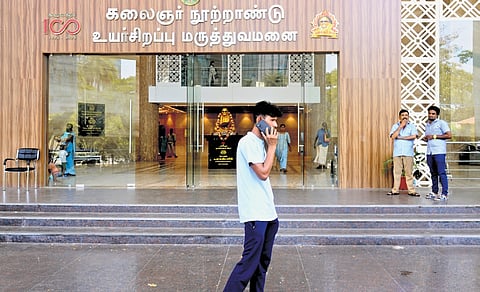

CHENNAI: Thriller movies about people trapped in natural enclosures battling to establish contact are all the rage now. However, a story about patients and staff in a super-speciality hospital struggling to communicate with each other would surely seem far-fetched. Well, this is sort of what everyone in Government Kalaignar Centenary Super Speciality Hospital on the King Institute campus in Guindy, encounters daily. The reason is that there is extremely poor mobile connectivity inside the building.
The 1,000-bed hospital was inaugurated last year and the patient flow has gradually increased. Around 1,200 outpatients daily visit the facility, which also has an in-patient strength of around 400. Inside the hospital, spread across around six lakh square feet, nurses and other medical staff are found running around in search of doctors at any time of the day. The work to install the intercom has not been completed yet. The hospital management said mobile phone signal boosters have been fixed on all the floors. However, the installation of a mobile tower is pending.
“In other hospitals, the ward staff call us over the phone in case of emergencies and we rush there. But, in the government Kalaignar hospital, the staff have to run several floors sometimes to alert the treating doctor if a patient’s condition deteriorates. This is proving risky for everyone involved,” one of the doctors at the super-speciality hospital said.
Concurring with the doctor, an out-patient (OP) ward attendant said he has to come out of the building every time he wants to make a call. “Which means the patient might have to be left unattended if I need to make an urgent call,” he added. A duty nurse, meanwhile, said there is no mobile signal in the ICU and the emergency ward. “So, as one nurse attends to the patient in the ICU, another will have to run to the emergency ward to alert the doctor. “In this way, it will take a minimum of five minutes for the doctor to reach the ICU. No life has been lost due to this so far,” the staff nurse added.
Speaking to TNIE, Srivatsav Vema, whose father was admitted to the hospital recently, said, “My father was assigned to a third-floor room and the scan room was on the ground floor. One day, I was standing on the ground floor and tried in vain to phone my father and his caretaker. Making matters worse, the lift was held up on the mezzanine floor and I couldn’t wait any longer. So, I climbed up three flights of stairs to speak to them. It took me over 15 minutes to climb up and bring them down to the scan room.”
In the last seven months, 1,370 elective and emergency surgeries have been performed at the hospital, said Dr L Parthasarathy, Director, Kalaignar Super Speciality Hospital. “We have installed signal boosters on all the floors and interior work has been completed. Vendors should now provide us with connectivity. While Vodafone has installed its tower, Airtel work is pending, and the Jio fibre is yet to be fixed. Intercom connection will established at the hospital soon,” he told TNIE.